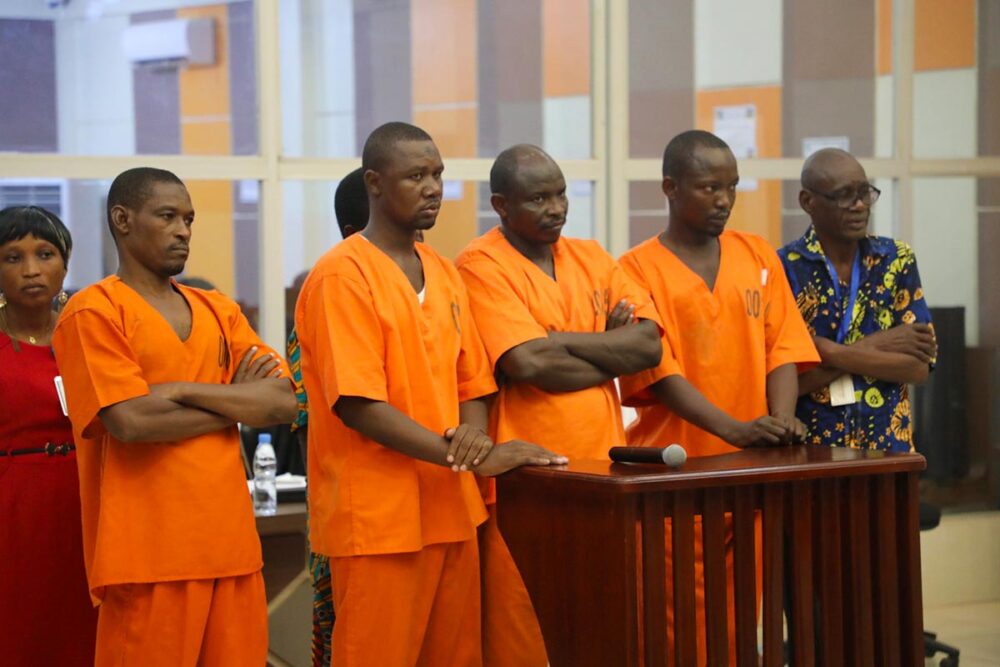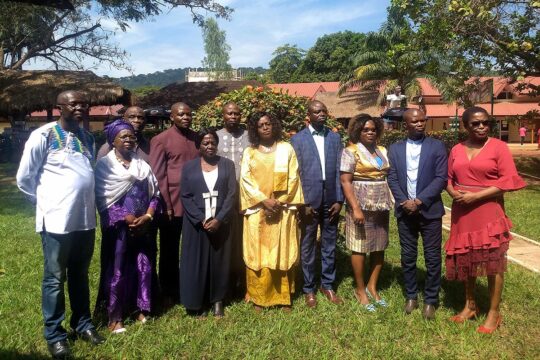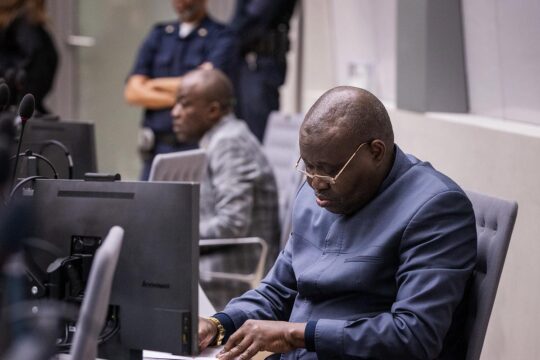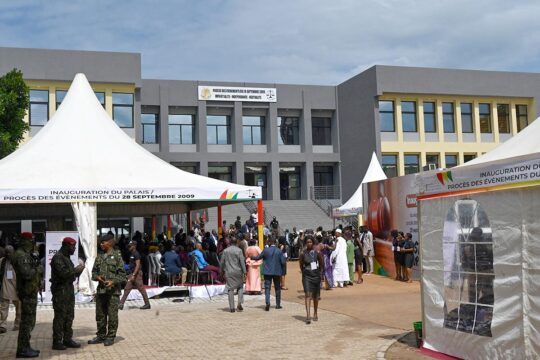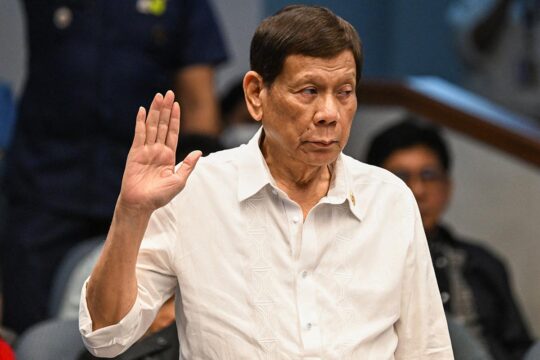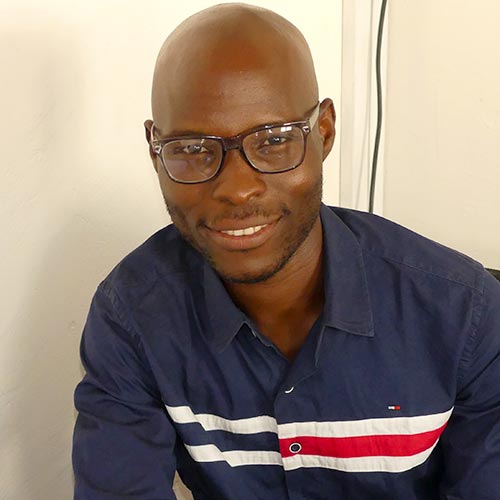For nearly a year, the four accused - Azor Kalite, Charfadine Moussa, Antar Hamat and Oscar Wordjonodrogba - have regularly sat in the box of the Special Criminal Court (CPS) in Bangui to answer the charges of war crimes and crimes against humanity committed in Ndélé, a town located 650 kilometres north-east of Bangui.
The civil party opened the closing arguments on Monday 4 November 2024. Albert Panda, one of the victims’ two lawyers, said he had been in Ndélé for ten days to gather the victims' expectations and requests for the trial. “More than six hundred people have expressed a desire to become civil parties,” he says in the courtroom. “This shows the impact that this conflict has had on the civilian population of Ndélé,” which has about ten thousand inhabitants.
Panda recalled the origins of the events in Ndélé, characterised by reprisals between two ethnic groups (the Goula and the Rounga), mostly present in the rebel movement, the Popular Front for the Rebirth of the Central African Republic (Front populaire pour la renaissance de la Centrafrique - FPRC). For the lawyer, it all started with the assassination of a Goula general, Issa Issaka Aubin, in circumstances that shocked his entire community. “That’s when the Goula response began to take shape. It resulted in the attack on 29 April 2020 at the Ndélé market. It was therefore a planned and coordinated attack,” he states. Thus, for the civil party, the responsibility of the defendants in the attack is clearly established.
“I ask your court to find Azor Kalite, Charfadine Moussa, Antar Hamat and Oscar Wordjonodrogba guilty of war crimes and crimes against humanity,” concludes Panda.
Sentences requested: 20 to 30 years’ imprisonment
The Special Public Prosecutor’s Office took to the stage on Tuesday 5 November 2024. In his closing arguments, Alain Tolmo, the first national deputy special prosecutor, called for a 30-year prison sentence for Kalite. He asked the court to sentence the other three defendants to 20 years in prison. All four were charged with war crimes and crimes against humanity.
To justify the difference between the sentences requested, the prosecution referred to the “principal” or “accessory” nature of the crimes. For the special prosecutor, Kalite is the principal perpetrator. He “solicited, encouraged, federated and psychologically influenced combatants to commit a crime”. This was done with “a well-defined intention and a well-developed plan”.
The public prosecutor outlined Kalite’s background. He started out as a “tracker,” working in nature reserves and guiding tourists during their visit to Ndélé in 1997. After working there for four years, he was recruited into the Central African Armed Forces (FACA) in 2001, where he was part of the presidential security force until 2003. A military instructor in Bouar in 2008-2009, he joined the Séléka rebellion in 2012. Following the fall of its leader, Michel Djotodjia, Kalite moved to Bria and continued to work in a branch of the FPRC rebellion. He then became chief of staff of a dissident branch of the movement after the death of Issa Issaka.
Tolmo explains that when he was arrested on 19 May 2020, along with other fighters, Kalite was in possession of seven Kalashnikovs, three machine guns, a bag of magazines, 350 rounds of ammunition and a yellow armband, the distinctive sign of the Goula during the clashes. “And with all this equipment, he came to lie to your court, that he had come to Ndélé on a humanitarian mission. If only we had found sugar packs in his hands,” the prosecutor quips. Tolmo brandishes another piece of “evidence”: “during the armed conflict between FPRC's Goula and Rounga factions, Azor Kalite told AFP on 7 March 2020 in his capacity as Goula chief: ‘our brothers in Ndélé were forced to leave the field. By tomorrow, we will take back the town’. How is he going to take back the town?” asks the prosecutor.
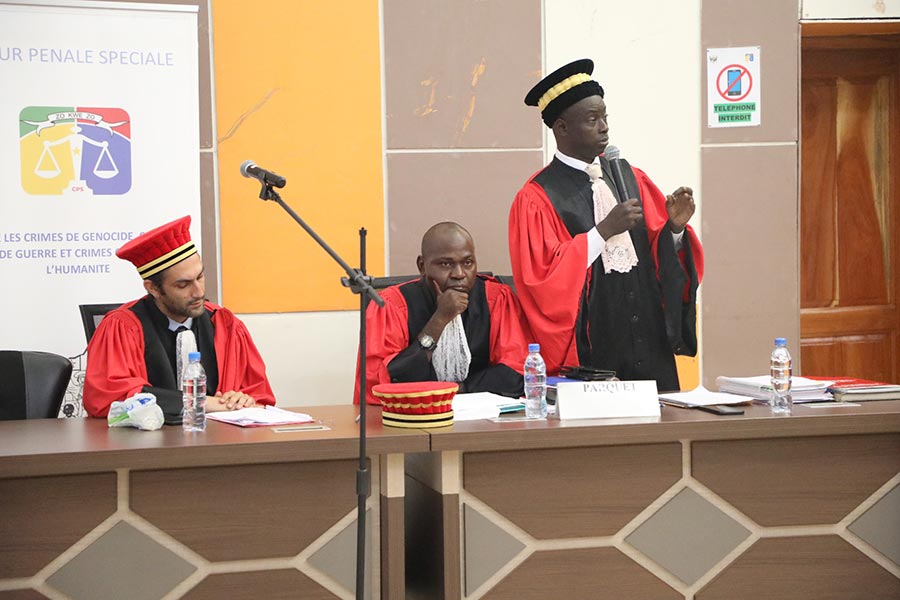
Azor Kalite, the mastermind?
In his closing argument, Tolmo quotes a statement made by Kalite to the investigators: “I came with around 30 people. They are all young people. They are desperate. They have lost their fathers and mothers. At the moment, there are 11,000 people whom I’m still protecting. The others are part of the Goula community and are defending the same cause. We were all in the village to defend the population.” The prosecutor is surprised that the accused has refused to sign the minutes of his hearing. “He says he thought it was just a chat.” But in the prosecutor’s view, the judiciary police officer had informed him that it was indeed an interrogation.
According to the prosecution, on the morning of 29 April 2020, witnesses saw Kalite leaving the closeby village of Léména in the company of FPRC leaders in the direction of Ndélé. Other Goula fighters have stated that he was fighting with them. And that the idea of wearing yellow armbands and strips of cloth came from him. “Azor Kalite was also involved in implementing the fighters’ plan of attack in the field. Regarding these issues, he had told the investigators to whom he had talked first: “we had all the means at our disposal: hunting weapons, weapons of war, AK47s, DMKs, home-made weapons, rocket launchers, 12-caliber shotguns... which we had taken back from the Runga. Afterwards, on 29 April 2020, we realised that in order to scare Abdoulaye Hissène [FPRC commander in chief at the time and considered to be behind the attacks against the Goula], we needed to go to Ndélé. We came just to prove to him that we too can do harm’.” “And harm was done,” says the prosecutor.
Charfadine Moussa, the right hand man?
According to the prosecution, Charfadine Moussa and Kalite launched the attack on the Ndélé market on 29 April 2020. A Goula from Birao, resident in Bria and considered to be one of the FPRC’s influential colonels, Moussa was arrested in Ndélé in the company of Kalite and in possession of two weapons. The prosecution notes that Moussa has constantly changed his statements. “He says one thing and its opposite. You will draw the consequences, Mr President !”
One witness stated that on 26 and 27 April 2020, he was in Léména, on the outskirts of Ndélé. On 29 April 2020, he was in Ndélé. In his statement to the investigators, Moussa said that he had answered Kalite’s call to come to the rescue of the Goula community attacked by the Rounga.
Was Wordjonodrogba really absent?
Oumar Oscar Wordjonodrogba, an ethnic Goula and member of the FPRC like the other three co-defendants, maintains that he did not take part in the fighting at Ndélé. However, he indicated that Kalite, Moussa and Antar Hamat, who had arrived a week before the attack on Ndélé, met at the house of a certain Ataïr English (who was prosecuted but did not appear in court) to plan the attack of 29 April 2020. However, telephone records locate Wordjonodrogba in Ndélé during all the attacks, from where he had several telephone exchanges (calls and text messages) with Kalite.
Did Antar Hamat participate in the attack?
A member of the FPRC and also an ethnic Goula, Hamat was arrested with the other co-defendants, in possession of a weapon. But he does not recall whether he bought it or it was given to him. The prosecution deplores a lack of consistency in his statements, but is convinced that Hamat was present among the Goula fighters alongside Kalite. “Witnesses have confirmed that he took part in the attack,” said the public prosecutor.
According to Romaric Kpangba, the deputy public prosecutor, the Ndélé market was not a military target and the people present were unarmed. This attack alone left 29 people dead, dozens injured and around a hundred shops were burnt and looted. According to Kpangba, murders (a crime against humanity and a war crime), inhuman and persecution acts (a crime against humanity), attacks against the civilian population (a war crime and a crime against humanity) and looting (a war crime) were committed. Kpangba points out that FPRC Goula fighters attacked the predominantly Rounga neighbourhoods of Ndélé and the central market on at least two occasions. These acts of violence resulted in several deaths by gunshot wounds, victims who were civilians and not taking part in the fighting. More than fifty bodies were buried in mass graves during the first two attacks, while 29 civilians lost their lives in the third attack.
“In the light of the above,” Tolmo concludes, “the Special Prosecutor notes that the individual responsibilities of Azor Kalite, Charfadine Moussa, Oumar Oscar Wordjonodrogba and Antar Hamat can be established beyond any reasonable doubt as co-perpetrators.”
The defence lawyers on the same line: acquittal
None of the defence lawyers pleaded guilty. All argue either that their clients were not in Ndélé at the time of the crimes, or that they had come to help their relatives attacked by the Rounga. The defence deplores the lack of evidence, and disputes the viability of the minutes of the hearing of the accused.
According to Marius Bangati, Wordjonodrogba’s lawyer, “any record obtained in violation of the conventions ratified by the CAR, including torture, is likely to be excluded from the proceedings,” he says, pointing out that his client had been tied up, placed in a container and questioned in the absence of a lawyer and an interpreter. For Bangati, “of all the witnesses who appeared before the court, none demonstrated the presence of Oumar Oscar Wordjonodrogba during the attack on 29 April 2020. We cannot simply focus on the fact that he is from the Goula ethnic group, that he was apprehended with the others and the fact that he had a weapon in his possession, to ask the Court to sentence him to 20 years in prison.” Bangati concludes by asking his client to be acquitted outright, since “he has had no involvement whatsoever in the attack on Ndélé on 29 April 2020”.
Claudine Bagaza, Hamat’s lawyer, accuses the Central African State of having done nothing to prevent these crimes from happening. She is also calling for the exclusion of the minutes and the acquittal of her client because, in her view, “there is no evidence to show that Antar Hamat has killed, pillaged or mutilated people etc. On the contrary, nine witnesses testified that he had helped people in difficulty”.
Fleury Hotto also called for an acquittal on behalf of Moussa. Hotto considered that the acts of murder, extermination, slavery, enforced disappearance, illegal imprisonment and torture had not been proven in this case. In particular, he stated that there was no evidence that his client had taken part in the acts of deportation of which he is accused, pointing out that the inhabitants themselves had left the neighbourhood for their personal safety, “which did not amount to forced deportation”.
Go and find the real culprits
Guy Antoine Dangavo, Kalite’s lawyer, then took the floor. “Witnesses called by the prosecution have clearly stated that they never saw Kalite in Ndélé. The witnesses do not mention Kalite, but speak of other assailants. During their statements, they said that they had heard. That they were not there. You need to take a step back from these statements, Mr. President. The people brought before your court are not the actual people. The prosecution needs to search elsewhere,” he insists.
As for Kalite’s role as coordinator, his lawyer says that he was a coordinator, but as part of the disarmament programme. And if the prosecution refers to the weapons seized from the accused, Dangavo retorts that his client is a soldier, that it is a service weapon and that “when he was arrested, his magazine was still intact. He had not fired a single bullet”. Dangavo follows his colleagues and asks his client be acquitted for lack of evidence.
In accordance with procedure, the defendants were given the floor for their final words. All say that everything had been said by their lawyers. “I have done nothing. I demand my release,” each of the defendants said in turn. The court has reserved the case for judgement on 13 December 2024.


